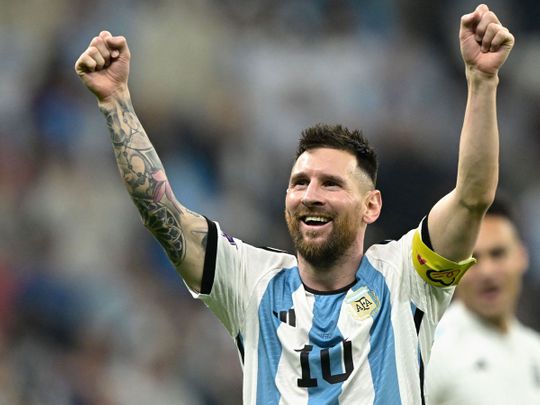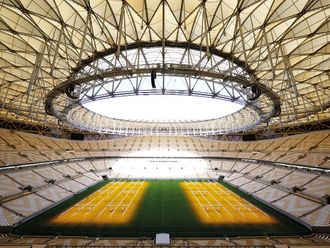
So Lionel Messi won’t be there for the 2026 World Cup in the Americas. He’s confirmed that to the Argentine sports newspaper Ole. I’m not complaining. I can’t. Because he’s produced a series of ethereal moments at the Qatar World Cup that will allow us to remember him with awe and admiration.
The Messi magic is not new to football watchers. He’s been conjuring impossible goals and assists for Barcelona for 17 years since his debut in 2003 at age 16. Even a move to Paris Saint-Germain in 2021 hasn’t dulled his creativity and appetite for scoring goals. More evidence of that is seen in Qatar.
After the horrendous start of losing to Saudi Arabia in the opener, Messi hauled Argentina back into World Cup contention with wondrous goals and assists. Each time the word magic was trotted out to describe his brilliance. But none more enchanting than the assist to Julian Alvarez to beat Croatia.
It was vintage Messi. A timely reminder that his sublime skills haven’t waned with the march of time. At 35, the Argentinian is no longer the tyro sprinting into the box past a posse of defenders to slot the ball past a bemused goalkeeper. Instead, he strolls to the edge of the penalty, threads passes through non-existent gaps in the defence and bends balls into goals when a sliver of a chance materialises for a nanosecond.
When Messi rolled back his years
The latest Messi moment was not a goal but an assist: the speedy run, the hustle and the splendid pass evoked memories of his halcyon days. Josko Gvardiol had shadowed Messi at the Lusail Stadium for much of Tuesday: that’s the job assigned by the Croatian coach Zlato Dalic. The youngster stuck to his brief.
Around 69 minutes had elapsed when Messi received the ball on the right, and Gvardiol was quickly onto him. And what unfolded in the next few seconds was incredible. The 35-year-old sprinted with the ball past the 20-year-old: the ageing football great simply skinned the tournament’s best defender.
Messi outpaced Gvardiol, then stopped abruptly and swivelled around to spin the Croatian like a marionette. Before Gvardiol could regain his balance and composure, Messi took a few dainty steps and cut back a pass at a 45-degree angle to Alvares to lash it home. From there, Argentina could never lose.
The Latin Americans are one win away from claiming their third trophy. The one Messi badly needs to silence his carping critics. To reaffirm that he is indeed the true successor to Diego Maradona, the wizard who gave Argentina their second cup win 36 years ago.
The Maradona millstone
Comparisons with Maradona always shadowed Messi. Both are diminutive, left-footed and possess superb dribbling skills. So the comparison was inevitable. When Messi struck the best goal of his career in 2007, dribbling past a horde of Getafe players and the goalkeeper, it was compared to Maradona’s wonder goal against England in the 1986 World Cup. Although that elevated Messi as the new superstar, it became a millstone around his neck. He was expected to emulate Maradona and win a World Cup for Argentina.
Four World Cups have gone by, and there was no sign of the trophy coming to Buenos Aires. Argentina came within a whisker of winning in 2014, but Mario Gotze nicked it for Germany. Qatar offers the final chance. A chance to bring Argentinians into the streets and hail the new king of football.
Messi would love that. He would happily trade his 35 major trophies, including 10 La Liga titles, seven Copa del Rey, four UEFA Champions League medals, and the seven Ballon d’Or for the World Cup. That’s the missing piece on his mantlepiece: one that would burnish his reputation as one of the best footballers in the world. Maradona would love that.




